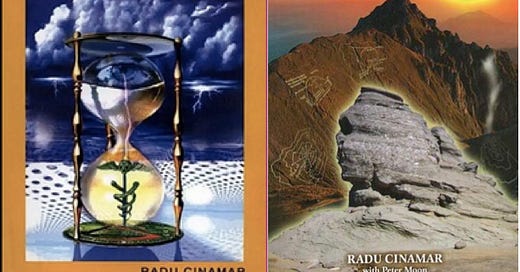THE FIRST ENCOUNTER: EVIL THROUGH AND THROUGH
May, 2002
At about three in the afternoon, a Romanian Intelligence Services helicopter landed at the base in Valea Ursului. From it emerged a tall, sober gentleman in a black suit. He was poised and haughty. In his right hand he carried a walking stick with an ivory handle ornately decorated in gold. His face betrayed a hard character and his green eyes radiated a strange coldness. This impression was made even stronger by his arched eyebrows, which were too well groomed for a man of sixty-five.
He introduced himself to the officers who greeted him at the base as Signore Massini and waited patiently for his arrival to be announced to Cezar. Of stately manner, as as if used to moving only in aristocratic circles, Signore Massini was overbearing, self-confident, and gave the impression of a man who was used to lording it over people, In fact, he was one of the highest-ranking venerables of the most important Masonic lodge in Europe and also a member of the most influential Masonic organization on a global level: the Bilderberg Group.
Signore Massini was shown to the first floor of the base, where Cezar was waiting for him. After the customary introductions, Cezar invited him to a protocol room, but the venerable one refused. Without being fastidious, his turn of phrase was rather stilted and dated. In fact, Signore Massini was a member of a very old noble family of royal blood from Italy.
“I am surprised and at the same time delighted with your proposal, but I retain the basic privilege to protect myself against likely attempts at listening in on our discussion. I should be very grateful if you did not take umbrage at the request, but we cannot forget that we are dealing with the Department of State Security,” he explained.
Cezar gave a faint smile. It was still difficult to assess whether that was Signore Massini’s habitual manner of speech or his words concealed a trace of irony. The second interpretation was more likely, but that did not bother Cezar at all. Instead, he replied in good will.
“I understand your fears, sir, and I find them warranted to a certain extent. But given its status, this base has a very high security level and only cooperates with the Securitate: it is not subordinate to it. Therefore we can talk in peace and without fear of anything in the protocol room.”
But Signore Massini stood firm in his request. He insisted politely that the discussion take place in the open at a convenient distance away from the base. He said that was in the interest of both parties. As the request was not excessive, Cezar gave his consent. A small clearing was chosen about 250 meters away from the buildings. A table and chairs were taken to the spot, and at a certain distance from the arrangement Cezar ordered a circle of eight bodyguards specialized in high-level protection. In fact, they were members of the third special intervention team in case of “K-type events.” A high-tech electronic jamming device was also installed.
Preparations took almost an hour, during which time Signore Massini made only a couple of comments and displayed a slightly sneering and ironic smile. From time to time he gave darting looks in Cezar’s direction, carefully trying to take his measure. At about four in the afternoon, preparations were ready and the two sat down at the table in the clearing.
Cezar told me that, from a certain point of view, the situation was rather biarre. A gentleman of incontrovertible influence at the highest political levels had requested a highly secret meeting with the executive director of the most secret department of the Romanian secret services. All doors had been opened almost effortlessly. What could be the nature of that mysterious influence that had broken even through the highest political circles of a state? What in fact was the purpose of Signore Massini’s unforeseen and secret visit and what was he after, particularly since he had avoided any interference by the Securitate, which had actually facilitated the meeting?
The strict order received from the goverment forbade any interference on the part of the Securitate with the discussion, all on the grounds of secrecy in Department Zero’s area of action. Despite all that, the situation was rather strange because it gave the impression of intervention by an external power that was “imposed” on the Romanian state. Moreover, no recording of the talks between the two was allowed and Cezar wanted to keep the promise he had made to Signore Massini. On the other hand, even if the Securitate had the means to listen in on the talks, Massini’s arrival had been announced hastily, leaving little time to prepare such an action.
In addition, given the influence that Signore Massini seemed to have at the highest political level in Romania, any dissatisfaction on his part might have had adverse consequences for anyone in the intelligence services who made such an attempt. Therefore, strange though it might seem, Massini had succeeded — through quick, intense and demanding action — in obtaining the maximum security for the talk he wanted to have with Cezar. The encounter between the two was to reveal the most sensational account of occult truths, which are nevertheless manifest more and more in the daily lives of people throughout the world. (pp. 114-117)
Cinamar, Radu (2003). Transylvanian Sunrise (originally published in Romanian as Viitor cu cap de mort: in culisele puterii). Westbury, New York: Sky Books.
Continued in Part 2





So, what's the direct translation of the title?.
Does mort signify death?